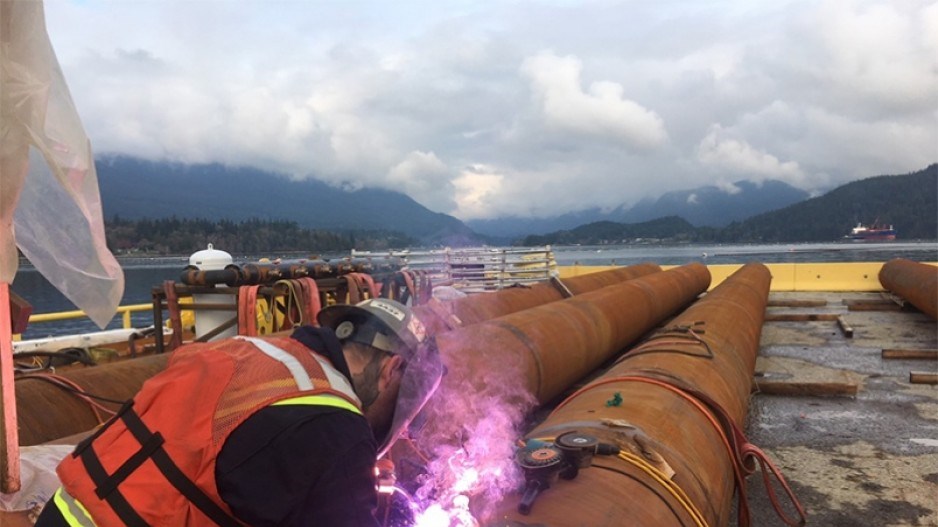Unlike many businesses in Canada, which are now either shut down or working with skeleton crews due to COVID-19, resource companies in B.C. last week were still building pipelines, producing lumber, pulp, paper and natural gas, and mining gold, copper and metallurgical coal.
But many have been cutting capital spending plans for 2020, reducing their workforces and deferring investments in new facilities or machinery.
Woodfibre LNG, for example, announced last week that it will defer the start of construction of its $1.6 billion LNG plant in Squamish until 2021, though that decision was not solely due to the COVID-19 pandemic.
Construction on the plant was due to start later this year. But a key contractor ran into serious financial troubles and filed for Chapter 11 bankruptcy proceedings in the U.S. in January.
Asked if the project would have been deferred even if the contractor had not run into problems, Woodfibre LNG CEO David Keane said, “Probably.”
“The company out of the U.S. that was doing the engineering, procurement and fabrication, their fabrication yards have been impacted by COVID-19, so things would have slowed anyway.”
Keane added the project will still be built – it’s just now being delayed by about a year. And like most companies right now, Woodfibre LNG is hunkered down, with most of the 30 employees working from home. Only a handful are still on site doing ongoing environmental remediation work.
LNG Canada has cut its workforce in Kitimat from around 1,750 to 875 to reduce the number of people coming to and from a large work camp in Kitimat. The associated $6.6 billion Coastal GasLink continues work on site clearing, with more than 60 per cent of the 670-kilometre route now cleared. It has reduced its workforce by 800 since February, but that is more due to spring breakup than COVID-19 management measures.
Trans Mountain Corp. has implemented a number of measures, like staggering shifts, to reduce worker-to-worker contact on its pipeline twinning project, but work continues on the its $12.6 billion expansion, at least for now.
B.C. forestry companies are cutting production at the Canadian and U.S. sawmills, and several mining companies are adjusting project plans and deferring capital investments.
Western Forest Products announced March 23 it would shut down all of its sawmills for one week and will be looking to reduce capital spending.
West Fraser Timber announced last week it will temporarily cut production at its Canadian mills by 18 per cent and its U.S. sawmills by 24 per cent – a total of 27 million board feet – and will temporarily shutter its plywood mill in Quesnel. These temporary measures are in effect until April 6.
It is deferring a planned maintenance shutdown of the Cariboo pulp mill it co-owns in Quesnel, but it may have to curtail production at some of its other pulp mills due to employee absence.
“Absences due to COVID-19 policy are increasing at some of the company’s other pulp mills, and it is possible that curtailment of operations at these mills may be necessary due to key technical resources not being available,” the company warned.
Interfor Corp. likewise plans to cut production by 60 per cent (35 million board feet) at its Canadian and U.S. operations and to slash capital spending this year by $140 million.
Beginning March 30, Canfor Corp. will take 70 million board feet out of production from its Canadian sawmills over a three-week period – a 40 per cent reduction.
“These reductions will be implemented across several British Columbia sawmills through a combination of temporary plant curtailments and reduced operating hours,” the company said in a news release.
Canfor has 10 sawmills in B.C. and pulp and paper mills in Prince George and Taylor.
Canfor will also take 50 million board feet out of production from its American sawmills, and 17 million board feet from its mills in Sweden.
The company will slash capital spending by $20 million in Canada and the U.S.
On its pulp side, Canfor Pulp will shut its Northwood Pulp Mill, which had been scheduled for a maintenance shutdown, for three weeks. Canfor Pulp will reduce its capital spending by $15 million.
Stock for all four forest companies took a healthy bounce last week (nearly 12 per cent for Interfor March 25), following a brutal beating in stock markets and general selloff in numerous sectors. Paper Excellence, which owns three pulp and paper mills in B.C., had not announced any curtailments as of March 25.
As for mining companies, at least one – Taseko Mines Ltd., which operates the Gibraltar copper mine in B.C. – is taking advantage of low fuel prices to bank some savings.
“Operating costs are dropping, with over 30 per cent lower diesel price as an example,” said Taseko CEO Russell Hallbauer. “In fact, we took advantage of the much lower diesel price and locked in a price that will reduce costs by more than $6 million in 2020.
“The weakened Canadian dollar against the U.S. dollar has partially offset the U.S. dollar copper price decline, and this too is benefiting our operating margin as roughly 80 per cent of Gibraltar’s costs are Canadian dollar denominated.”
Other mine companies are altering mine plans and capital expenditures.
Copper Mountain Mining Corp. took action early. On March 10, it announced the deferring a US$22 million investment in a new ball mill, and is adjusting its mine plans at Copper Mountain mine, where it will defer until next year plans to mine a higher-grade pit, in the expectation that copper prices will have rallied by then.
Conuma Coal’s three metallurgical coal mines were still operating as of March 25. The company has hired an occupational physician to monitor mine site workers, and occupational hygiene experts to ensure workplace sanitary conditions.



